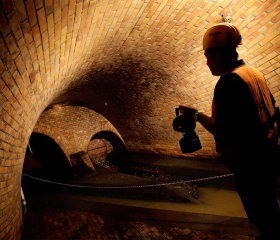In late July 2016, a French National Assembly delegation paid yet another visit to Russia. Most of those who made up the delegation were also among the members of parliament who had visited last year. Just like last year, they were led by Member of the French National Assembly for French Residents Overseas Thierry Mariani. And like last year, Crimea was in the spotlight: visiting the peninsula, the guests attended a variety of Navy Day celebrations and special events. They also gave a few speeches of their own. Has the French parliamentary rhetoric changed one year on? Was it a good idea for them to come back?
In late July 2016, a French National Assembly delegation paid yet another visit to Russia. Most of those who made up the delegation were also among the members of parliament who had visited last year. Just like last year, they were led by Member of the French National Assembly for French Residents Overseas Thierry Mariani. And like last year, Crimea was in the spotlight: visiting the peninsula, the guests attended a variety of Navy Day celebrations and special events. They also gave a few speeches of their own. Has the French parliamentary rhetoric changed one year on? Was it a good idea for them to come back?
Inside man in Paris
Thierry Mariani’s political value is, in many respects, built on his favourable attitude towards Russia – a stance he has repeatedly demonstrated to the wider public – as well as on stable ties with a number of Russian public officials (such as Prime Minister of the Republic of Crimea Sergey Aksyonov, Chairman of the State Duma Committee on the CIS, European Integration and Links with Compatriots Leonid Slutsky). During his first visit to Crimea in 2015, the former Secretary of State saw the recent developments on the peninsula with his own eyes and made a number of comments praising the efforts of Russian leaders and locals. The visit gave the impression of complete understanding: the parties agreed that the return of Crimea to Russia was an act of historical justice and that the rationale behind the sanctions was hardly productive; the member of the French parliament also praised the insightful decision of the local authorities to hold a referendum ensuring that Crimea’s accession to Russia involved no bloodshed.
A year later, the stance of the French delegation has not changed. However, this time, they went beyond official statements supporting Russia and condemning the sanctions and intimated the tentative date on which the French parliament would officially consider the status of Crimea, that is, in spring 2017. It is, however, likely, that Mr. Mariani was not being entirely truthful: the results of the presidential election will not be known until May next year. It is true that ever since presidential and legislative elections were brought into sync in France in the early 2000s, the party of the president-elect never failed to win the parliamentary vote in the wake of the presidential election. Nevertheless, the new makeup of the National Assembly will not be determined until June 2017, and it is far from certain that the issue of Crimea and the sanctions will be at the top of the agenda.
The centre-right Republican party to which Thierry Mariani and most of the other delegates belong and which stands a real chance of winning the elections will possibly agree to discuss the matter. However, it would be too rash to write off the Socialist Party, despite the recent streak of bad luck and misjudgments of President Francois Hollande and his governments. Suffice to quote recent history: in the summer of 2007, after the victory of Nicolas Sarkozy, the Union for a Popular Movement was expected to win by a landslide, but the Socialist Party, unperturbed by its formal defeat, managed to secure an even greater number of seats in the Palais Bourbon. The decision to reconsider the situation in Crimea and the sanctions regime will most likely depend not so much on the victory of the Republican Party, but rather the scale of the victory. If the margin of victory is not overwhelming, the new majority may feel inclined to avoid the uncomfortable discussion.
Meanwhile, efforts have already been made in this direction, proving Thierry Mariani was ready to walk the walk. For one, he authored the resolution on measures to lift sanctions from Russia that was considered by the National Assembly in April 2016. Although the document was slated to serve as a message for the government, its importance was derailed by the fact that it was merely advisory and the majority of members of the National Assembly were absent on the day of voting (55 of the 101 delegates in attendance voted for the motion; there are a total of 577 seats in the lower chamber). As a result, the French Ministry of Foreign Affairs only issued a brief comment on the need to abide by the Minsk Protocol, without reconsidering its stance on the matter.
Ties Benefit Everybody
With the second visit complete, Russia expects not only a political result, but also a more palpable benefit. Specifically, the delegates are expected to explain the investment opportunities Crimea has to offer to French entrepreneurs back home. In turn, Russia has been making considerable efforts to showcase its willingness to cooperate with foreign businesses despite the sanctions. The visit of the Mariani-led delegation served as another opportunity to announce, through European political figures, that the sanctions regime will soon be lifted. French businesses that are actively interested in the Russian agricultural industry are looking for assurances about their future in Russia. Because of this, guarantees from their compatriots, as well as the President of Russia, are comforting.
The underlying political reason for the return visit could also be described in terms of “raising the sanctions siege” and maintaining contacts with friendly segments of the political establishment on top of the general sentiment of distrust disseminated by official media channels. Moscow has consistently pursued its tactics of disrupting the “formation” of its opponents, emphasizing the lack of unity in European political circles. From this perspective, invoking major players on the political arena (such as the French Republicans) rather than forces of questionable track record (the National Front in France, the Five Star Movement in Italy, etc.) is more convincing.
Meanwhile, it would be wrong to say that all Republican leaders are of the same mind as Thierry Mariani when it comes to his optimism about Russia: as a rule, prominent political figures tend to give more reserved assessments of Russia’s actions, even if the general tone is favourable. The decision of the party’s leader, Nicolas Sarkozy, who chose to visit Moscow rather than Crimea in October 2015 for direct talks with Russian President Vladimir Putin, is illustrative of this. He returned in June 2016, this time to meet the President in St. Petersburg on the sidelines of the St. Petersburg International Economic Forum. Both visits were touted as top level meetings, without any ambiguity or populism, as if none of the participants ever left their posts. That being said, the high profile of the meetings compelled the French side to be more prudent in its statements (citing the “responsibility” which, in combination with its rights, Russia had to honour as a global player).
Free from the burden of the responsibility as party leader, Thierry Mariani is put to more sensitive tasks (visits to Crimea and Damascus), where he can openly support the host party and subsequently relay the position at home. Obviously, political figures of the highest profile who are intent on garnering the support of the more sceptical party members (Nicolas Sarkozy, Alain Juppe and Bruno Le Maire) cannot afford such a bold stance. Furthermore, we cannot completely disregard Thierry Mariani’s personal political interest: in the incumbent National Assembly, he represents the French living abroad, with some of his electorate currently in Russia. Therefore, his brief stop in Moscow to meet the French community representatives before going on to Crimea was actually a meeting with his voters. Seen against the background of the upcoming Republican primaries scheduled for November 2016, with Mariani openly endorsing the presidential bid of the former Prime Minister Francois Fillon, the move even gains in importance, since centre-right Republicans living abroad have a right to vote in the primary.
All political intricacies aside, there is one point we can definitely agree on with Mr. Mariani: the official stance of Paris on Crimea and the sanctions against Russia is not going to be revisited right away. Come autumn, both ruling and opposition forces will be wrapped up in their election campaigns and primaries, with economy and security, rather than international relations and dialogue with Russia, likely taking centre stage. This means that new decisions are not likely to be made until after the election period of May–June 2017, and then only if the part of the Republican party which has already proven more open to Russia wins the election. It is highly probable that no comprehensive “reset” of Russian–French relations will be in sight until then.






